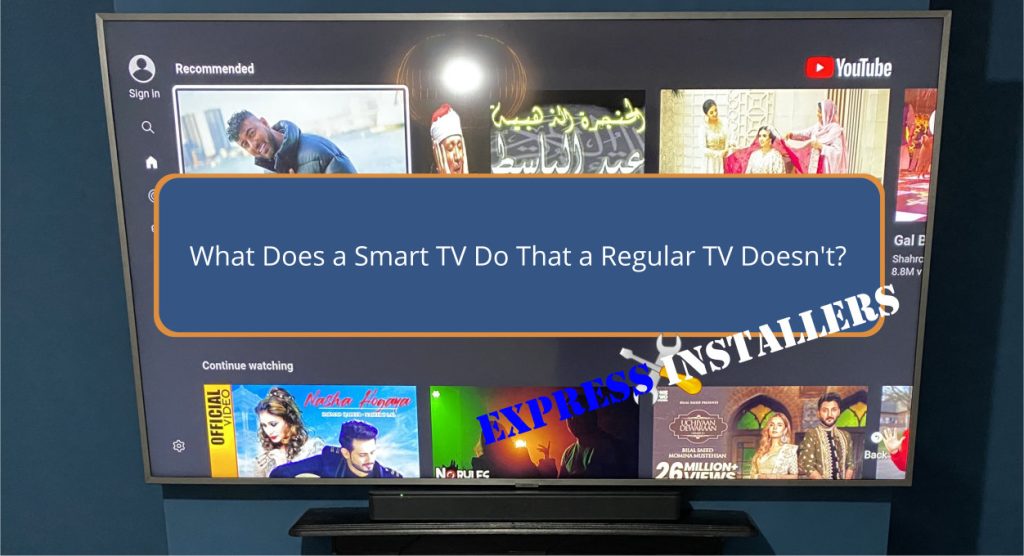
A smart TV connects to the internet, allowing you to stream content directly from services like Netflix and without needing extra devices.
You can download various apps, get personalised recommendations, and easily switch between streaming platforms.
Smart TVs also support voice control for convenience and integrate with smart home devices, enabling you to adjust lighting or check security cameras from your TV.
Additionally, they offer screen mirroring from your smartphone or tablet. If you want a more versatile and integrated viewing experience, there’s more to discover.
Smart TVs, with their built-in internet connectivity, let you access streaming services directly without needing extra devices. This feature sets them apart from regular TVs, which lack internet capabilities and are limited to traditional cable channels.
With a smart TV, you can download apps, receive software updates, and enjoy on-demand content, offering a more versatile entertainment experience.
On the other hand, regular TVs require external devices like streaming boxes to access online content. Smart TVs’ internet connectivity expands your viewing options and keeps your system up-to-date with the latest features and improvements.
This integration makes smart TVs a more convenient and all-encompassing choice for modern entertainment needs.
Thanks to popular streaming services like Netflix, Hulu, and Amazon Prime Video, smart TVs offer a broader range of entertainment options than regular TVs.
With a smart TV, you can enjoy on-demand content and live TV streaming that traditional sets simply can’t provide. This seamless integration allows you to explore a vast content library without needing extra devices.
Here’s what you get with a smart TV:
Regular TVs are limited to traditional broadcast channels, making smart TVs a more versatile and convenient choice for modern entertainment.
You can further enhance your viewing experience on a smart TV by downloading apps for various streaming services and other content-specific applications.
Unlike regular TVs, smart TVs allow you to install apps for popular streaming platforms like Netflix and Hulu, providing a broader range of entertainment options beyond traditional broadcast channels.
This capability also extends to news, sports, music, and more apps, letting you customise your viewing experience to fit your interests.
Regular TVs lack this feature, limiting your content availability. By enabling app downloads, smart TVs offer greater convenience and a more diverse selection of entertainment choices.
This makes them a versatile option for modern viewers seeking tailored content.
Harnessing voice control technology, smart TVs let you change channels, adjust volume, and search for content with simple voice commands. This feature isn’t available on regular TVs, which require manual adjustments via remote controls or on-TV buttons.
Voice control enhances convenience and accessibility, making it easier for everyone, especially those with mobility or visual impairments, to interact with their TV.
Here are some key benefits of voice control on smart TVs:
Smart home integration allows you to control and monitor various devices from your smart TV, enhancing convenience and efficiency.
You can seamlessly connect with smart thermostats, lights, and security systems. You can adjust the temperature, dim the lights, or check security cameras using your TV.
This integration contributes to energy efficiency by enabling automated control of these devices, reducing unnecessary energy use. Additionally, smart home integration enhances safety measures by allowing you to monitor cameras and sensors directly from your TV screen.
As managing home technology becomes more convenient, the popularity of smart TVs with these capabilities continues to grow, making them a central hub in modern smart homes.
Screen mirroring lets users wirelessly display smartphone, tablet, or laptop content on their smart TV screens. This feature makes it easy to share photos, videos, presentations, or apps directly on the larger display without cables or adapters.
Smart TVs support various screen mirroring technologies like Miracast, AirPlay, and Chromecast, making them versatile for different devices. Regular TVs don’t offer this capability, so you’d miss out on the convenience and versatility of screen mirroring.
With screen mirroring, you can:
In short, screen mirroring enhances your viewing and sharing experience significantly.
You might face privacy risks since smart TVs can track your viewing habits. Additionally, performance issues like input lag, freezing, and crashing are common due to limited processing power and storage, affecting your overall experience.
You should choose a smart TV if you value internet connectivity, streaming services, and advanced features like voice control and smart home integration. However, a regular TV might be better if you prefer simplicity and lower cost.
You don’t need anything extra with a smart TV. It has built-in internet connectivity and streaming apps, eliminating the need for additional devices like streaming boxes or sticks to access online content and popular streaming services.
You can just plug in a smart TV to access essential functions. However, to fully utilise its features, you must connect it to Wi-Fi or Ethernet for streaming services and apps.
In short, a smart TV offers more than just traditional viewing. You can connect to the internet, access various streaming services, and download apps for additional functionality.
It also supports voice control and can integrate with other smart home devices, making your home more connected and convenient.
Plus, with screen mirroring, you can easily display content from your smartphone or tablet.
A smart TV truly enhances your entertainment experience.
Mon-Fri: 24 Hours
Sat: 24 Hours
Sun: 24 Hours